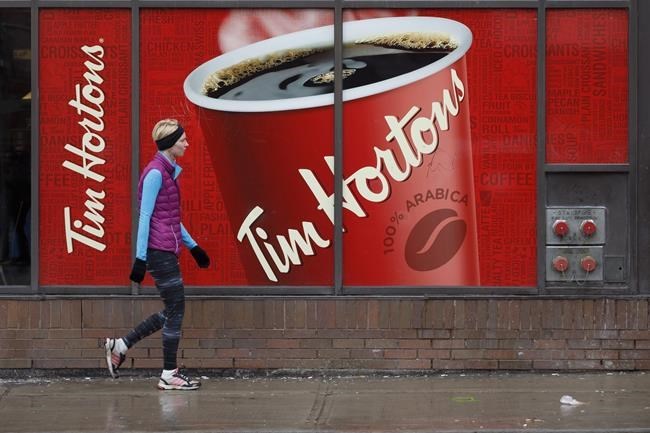In one of the surest signs 91ԭ�� workers are returning to downtown offices, Tim Hortons says sales at its "super urban" restaurants are rebounding to near pre-pandemic levels.
The coffee and doughnut chain's parent company Restaurant Brands International Inc. said Tuesday sales at its downtown locations jumped 30 per cent in its latest quarter compared with last year.
Tim Hortons' inner-city coffee shops, often located near office towers and in food courts, were hit hardest by the work-from-home trend.
Restaurant Brands CEO José Cil called the turnaround at these locations a "testament to the improvement in mobility."
"We saw accelerating underlying sales trends throughout the quarter as restrictions eased across the country and mobility increased," he said during a call with analysts.
"Comparable sales at our super urban locations grew nearly 30 per cent year over year during the quarter, with each month growing faster than the prior."
Tim Hortons posted "especially strong results" in March with comparable sales improving weekly, Cil said.
Despite the sales growth, the restaurant is also seeing rising input costs, pushing up some menu prices.
"We are seeing a significant increase in commodity volatility, leading to elevated levels of inflation," Restaurant Brands chief operating officer Josh Kobza said during the conference call.
"Given the fact that we generally take a pass-through approach, inflation has increased both our revenues and expenses."
His comments came as Restaurant Brands, which also includes Burger King, Popeyes Louisiana Kitchen and Firehouse Subs, reported its net income attributable to common shareholders totalled US$183 million in its first quarter, up from US$179 million a year earlier.
The company said its profit amounted to 59 cents per diluted share for the quarter ended March 31 compared with 58 cents per diluted share a year earlier.
Revenue for the company, which keeps its books in U.S. dollars, totalled US$1.45 billion, up from US$1.26 billion in the same quarter last year.
Comparable sales at Tim Hortons rose 8.4 per cent, while Burger King gained 10.3 per cent. Comparable sales at Popeyes fell 3.0 per cent and Firehouse Subs added 4.2 per cent.
Meanwhile, Tim Hortons also hosted its first investor day on Tuesday, which included details on the brand’s business and growth plans.
The company's leadership team reviewed the restaurant's so-called back-to-basics plan, an $80 million corporate investment in Canada announced in 2021.
The plan has lead to technology upgrades like digital menu boards and new coffee brewing machines along with improvements to Tim Hortons' core core menu items — coffee, doughnuts and breakfast.
In March, for example, the chain announced the relaunch of two of its most popular doughnuts. It said the Apple Fritter now has 40 per cent more apples while the Boston Cream has a third more filling.
Still, despite the tech upgrades and menu improvements, Tim Hortons president Axel Schwan said it's been a "challenging two years in Canada for restaurant owners and their team members."
"Canada has actually had some of the longest lockdown measures in the world," he said during the investor day conference. "Coupled with global headwinds and commodity and labor costs, the profitability of our owners is always at the top of our priority list."
This report by The 91ԭ�� Press was first published May 3, 2022.
Companies in this story: (TSX:QSR)
Brett Bundale, The 91ԭ�� Press



